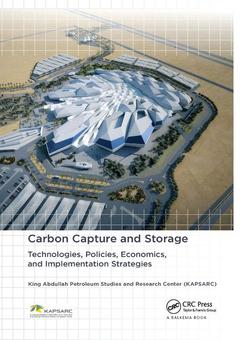Description
Carbon Capture and Storage
Technologies, Policies, Economics, and Implementation Strategies
Language: English
Keywords
CCS Project; co2; CCS Deployment; gases; CO2 Storage; energy; CO2 Capture; effi; CO2 Geological Storage; ciency; EU ETS; transport; CCS Technology; geological; Geological Storage; stream; Deep Saline Aquifer; enhanced; CO2 EOR Project; oil; Technology CCS; Regulate GHG Emission; CO2 Stream; CO2 Transport; CCS Chain; CO2 EOR; IEA Projection; GHG Mitigation; CCS Activity; CCS Development; CO2 Injection; Lake Nyos; CO2 Separation; Post-combustion Capture; CO2 Plume
Publication date: 08-2018
· 17.4x24.6 cm · Paperback
Publication date: 11-2011
380 p. · 17.4x24.6 cm · Hardback
Description
/li>Contents
/li>Readership
/li>Biography
/li>
This book focuses on issues related to a suite of technologies known as ?Carbon Capture and Storage (CCS),? which can be used to capture and store underground large amounts of industrial CO2 emissions. It addresses how CCS should work, as well as where, why, and how these technologies should be deployed, emphasizing the gaps to be filled in terms of research and development, technology, regulations, economics, and public acceptance.
The book is divided into three parts. The first part helps clarify the global context in which greenhouse gas (GHG) emissions can be analyzed, highlights the importance of fossil-fuel producing and consuming nations in positively driving clean fossil-fuel usage, and discusses the applicability of this technology on a global and regional level in a timely yet responsible manner. The second part provides a comprehensive overview of present and future technologies for the three elements of the CCS chain: CO2 capture, transport, and geological storage. The third part addresses the key drivers for CCS deployment worldwide. It provides analysis and assessment of the economic, regulatory, social, and environmental aspects associated with CCS development and deployment on a global scale. It offers a somewhat different perspective on CCS deployment by highlighting the environmental and socio-economic costs and benefits of CCS solutions compared to alternatives.
The book concludes with potential options and guidelines for sustainable and responsible CCS scale-up as a way to address prevailing global energy, environment, and climate concerns.
Saud M. Al-Fattah is Director of Global Energy Markets and Economics Research at the King Abdullah Petroleum Studies and Research Center. Saud has more than 25 years of experience with Saudi Aramco working in several petroleum engineering departments including reservoir management, oil and gas reserves assessment and fields’ development studies, reservoir simulation and reservoir engineering systems. His areas of specialty include: reservoir management, energy markets and economics, artificial intelligence, and strategic management.
Saud has a U.S. patent, published several technical papers in peer-reviewed journals, and authored and co-authored three books: Innovative Methods for Analyzing and Forecasting World Gas Supply, Artificial Intelligence and Data Mining Applications in the E&P Industry, and Carbon Capture and Storage: Technologies, Policies, Economics, and Implementation Strategies. He is an active member of the Society of Petroleum Engineers (SPE), the International Association for Energy Economics (IAEE), and the European Association of Geoscientists & Engineers (EAGE). He is also a member of the SPE Artificial Intelligence & Petroleum Analytics Subcommittee.
Saud is a technical editor for the SPE Reservoir Evaluation & Engineering Journal, Natural Gas Science and Engineering Journal, and several other industry publications. He held the positions of vice chairman of the 2006 SPE Saudi Arabia Annual Technical Symposium, and chairman of the 2007 SPE Saudi Arabia Annual Technical Symposium.
He earned his Ph.D. with distinction from Texas A&M University, and M.S. and B.S. degrees with honors from King Fahd University of Petroleum and Minerals (KFUPM), all in petroleum engineering. Murad Barghouty is Director of Energy and Environmental Technology Research at the King Abdullah Petroleum Studies and Research Center (KAPSARC). He has 24 years of experience in Saudi Aramco encompassing assignments in reservoir management, reser




